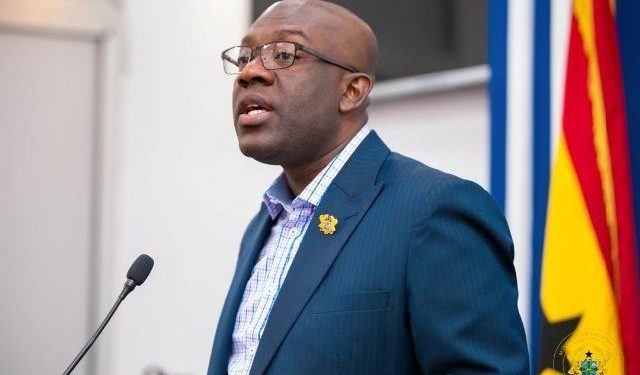Government has been giving details on its decision to approach the International Monetary Fund (IMF) for assistance to weather it financial instability reportedly sparked by internationally induced crisis.
According to the government, the conditions that evoked its decision to go to the Bretton Woods institution for support are absolutely different from the situation that existed when Ghana last went to the Fund in 2014/15.
The Information Minister, Kojo Oppong Nkrumah, explains that Ghana going to the IMF is not about the domestic economic management rather but it is about an international crisis-induced phenomena that has brought over one hundred countries including Ghana, to a point where their buffers have been eroded and they need to respond.
“But this is not a situation in which you have a self-induced crisis. This is a different scenario all together. It is not about your domestic economic management, it is about an international crisis-induced phenomena that has now brought you to a point where your buffers have been eroded and you need to respond.
“That is why for example, from 2020, about half of the world’s countries are applying to the Fund for some support. It is not to say that all of the people who manage all of these over one hundred economies do not know how to go about their jobs but is it evident of the fact that something external, something exogenous has hit, that is why today, Egypt, Kenya, I understand Tunisia is also applying for some sort of support, are asking for support,” he stated on an Accra based TV3.
The lawmaker for Ofoase-Ayirebi indicated that the government has not been embarrassed by this decision because the reasons that have brought us here are quite clear, indicating that “If you look at the performance of Ghana’s economy between 2017 and 2019, yes there were still some structural challenges in Ghana’s economy but the economy was performing way better based on, particularly, the fiscal and monetary policy measures and the broader economic policy measures that the administration was rolling out.
“The results were that we were doing better , inflation rate was going down , interest rates were going down , we were having the opportunity to create some more jobs and some more development programmes in the economy. In 2020 ,that stopped, primarily because our economy still with its challenges, was hit by major external factor, not just our economy, many economies around the world. In 2021, we started a path to recovery, so you will notice that in 2021 even though we had depleted a good chunk of our buffers and our reserves, we were still now building back better, trying to rebuild our reserves and trying to get our economy back on track.
“Then, the first part of 2022, I think in February, you had what occurred in the Black Sea area, giving the world another major crisis. Now there is high food prices all over the world , high fuel prices , high cost of financing and it is biting Ghanaian a lot.
“Do you have the domestic buffers still to respond to them? You don’t. You are now just trying to recover and rebuild and so if you look at all your options, despite the initial thinking that you could rebuild those buffers domestically, the president has decided that it is important we start engaging with the Fund for the possibility of getting a balance of payment support from them. To help us rebuild our buffers and better mitigate what is happening around the world and happening here in Ghana as well.”
On Friday July 1, 2022 President Nana Addo Dankwa Akufo-Addo instructed the Minister of Finance, Ken Ofori-Atta to commence engagements with the IMF following a telephone conversation between the President and the IMF Managing Director, Kristalina Georgieva, conveying Ghana’s decision to engage with the Fund.
The Ministry of Information announced this in a statement issued on that day.


